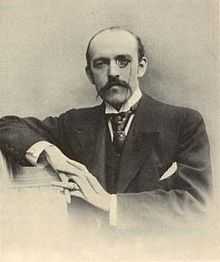Henri de Régnier
| Henri de Régnier | |
|---|---|
 | |
| Born |
December 28, 1864 Honfleur, France |
| Died |
May 23, 1936 (aged 71) Paris |
| Resting place | Père Lachaise Cemetery |
| Occupation | Poet, novelist |
| Language | French |
| Nationality | French |
| Literary movement | Symbolism |
| Spouse(s) | Marie de Régnier |
| French literature |
|---|
| by category |
| French literary history |
| French writers |
|
| Portals |
|
Henri-François-Joseph de Régnier (December 28, 1864 – May 23, 1936) was a French symbolist poet, considered one of the most important of France during the early 20th century.
Life and works
He was born at Honfleur (Calvados) on the 28th of December 1864, and was educated in Paris for law. In 1885 he began to contribute to the Parisian reviews, and his verses were published by most of the French and Belgian periodicals favorable to the symbolist writers. Having begun as a Parnassian, he retained the classical tradition, though he adopted some of the innovations of Jean Moréas and Gustave Kahn. His vaguely suggestive style shows the influence of Stéphane Mallarmé, of whom he was an assiduous disciple.
His first volume of poems, Lendemains, appeared in 1885, and among numerous later volumes are Poèmes anciens et romanesques (1890), Les Jeux rustiques et divins (1890), Les Médailles d'argile (1900), La Cité des eaux (1903). He is also the author of a series of realistic novels and tales, among which are La Canne de jaspe (2nd ed., 1897), La Double maîtresse (5th ed., 1900), Les Vacances d’un jeune homme sage (1903), and Les Amants singuliers (1905). Régnier married Marie de Heredia, daughter of the poet José María de Heredia, and herself a novelist and poet under the pen name of Gérard d'Houville.
La Canne de jaspe and Histoires Incertaines (1919) were translated in 2012 by Brian Stableford under the title A Surfeit of Mirrors ISBN 978-1-61227-076-0
Henri de Régnier died in 1936 at age 71 and was interred in the Père Lachaise Cemetery in Paris.
References
| Wikimedia Commons has media related to Henri de Régnier. |
-
 This article incorporates text from a publication now in the public domain: Chisholm, Hugh, ed. (1911). Encyclopædia Britannica (11th ed.). Cambridge University Press
This article incorporates text from a publication now in the public domain: Chisholm, Hugh, ed. (1911). Encyclopædia Britannica (11th ed.). Cambridge University Press
| |||||
|